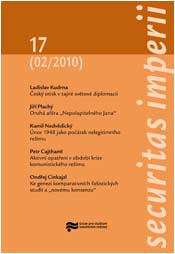Politický úkol. Aktivní opatření v období krize komunistického režimu
A political task. Active measures at a time of crisis for the communist regime
Author(s): Petr CajthamlSubject(s): Politics, Government/Political systems, International relations/trade, Security and defense, Post-War period (1950 - 1989)
Published by: Ústav pro studium totalitních režimů
Keywords: Czechoslovakia; State Security agency; communism;Prague Spring
Summary/Abstract: This study describes the activities of the Czechoslovak State Security agency in the department dealing with so-called “influence politics” (propagating active measures and disinformation) during the period following the occupation of Czechoslovakia by Warsaw Pact forces. It chronicles the time of immediate paralysis that followed the invasion of August 1968, which was a period of frantic activity during the struggle for power and the efforts of subsequent “normalisers” to assert themselves. Ultimately,it also depicts the first years of hard-line communist entrenchment following the invasion, which was called “normalisation”. This period was a time when a structure was created for intelligence operations aimed at wielding political influence, which continued throughout the 1970s and 1980s. State Security’s main tool in the preparation and implementation of active measures was the propagation of reports that were intended to damage or confuse enemies and to promote its own influence. The methods they used consisted of classic press propaganda, the circulation of leaflets,the distribution of falsified correspondence and direct contacts with agents.The Prague Spring, the occupation of Czechoslovakia by Warsaw Pact forces, and the subsequent period of normalisation resulted in a number of upheavals in the work of the intelligence service of the Ministry of the Interior. In the years 1969-1971,it used State Security’s active measures and counterintelligence methods. The main aim of active measures during the advent of normalisation was to support conservative,pro-Soviet groups in Czechoslovak politics and to remove the influence of reformists, opposition groups and émigrés whilst stabilising the regime, which had been badly shaken. Most existing operations aimed at the so-called “main adversary”(i.e. the USA and its allies) had to be curtailed or completely terminated due to the decimation of the State Security apparatus. (Some important State Security officerse migrated and many had to leave the agency after political purges.)The study recounts the organisational and personnel changes in State Security departments which were implemented by active measures, and it describes the objectives and character of the main operations of this type. The author also devotes attention to changes in the cooperation between the disinformation departments of Czechoslovak State Security and the intelligence services of other countries in the Soviet Bloc.
Journal: Securitas imperii
- Issue Year: 2010
- Issue No: 17
- Page Range: 80-105
- Page Count: 25
- Language: Czech

